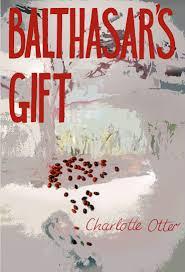 There’s a back story to this one. Once upon a time, now many years ago, a group of women writers, all friends online, came together over a feminist blog: What We Said. We were all involved with different kinds of writing; novels, short stories, nonfiction. Now one of our group has published her crime novel, Balthasar’s Gift, which is the first in a series featuring maverick journalist, Maggie Cloete.
There’s a back story to this one. Once upon a time, now many years ago, a group of women writers, all friends online, came together over a feminist blog: What We Said. We were all involved with different kinds of writing; novels, short stories, nonfiction. Now one of our group has published her crime novel, Balthasar’s Gift, which is the first in a series featuring maverick journalist, Maggie Cloete.
The setting is South Africa, post-apartheid but before the turn of the millenium. Maggie is going about her normal business (chasing muggers on her motorcycle, in fact) when the call comes in: a shooting at the local AIDS mission. Maggie arrives to find a young man dying in the arms of the woman who runs the place, and it’s only when a passer-by knows the victim’s name, Balthasar Meiring, that Maggie realises she’s heard of him. A little while back he had called her on the phone, urging her to attend the court hearing of a class action against a doctor selling a fake cure for AIDS. Maggie had decided to pass the information onto her colleague at the paper who works on health issues, mostly because she was resisting the pressure Meiring seemed to want to put on her. And of course now, she regrets it.
While the general assumption is that his death is a robbery gone wrong, Maggie begins to suspect there’s a great deal more behind it. Following up on leads that she hides from her editor at the paper, she begins to believe that the two sides of Balthasar’s life have clashed: his private school friends, some of whom are now operating far too close to the limits of the law, and his work with AIDS sufferers, of whom there are escalating numbers. It’s the mid-90s and the government is reluctant to provide the drugs that could save thousands of lives, while the people react with fear and superstition. It’s a bad situation, ripe with all the urgency and exploitation that leads to murder.
Maggie is a terrific character: determined to be the alpha male in any situation, stubborn and provocative and with the subtlety of a jackhammer, but fundamentally it’s her tender side that gets her into trouble, undermining any professional distance she might try to have. She reminds me a whole lot of V. I. Warshawski.
But perhaps what I admired most in this novel is the setting of Pietermaritzburg. I’ve never been to South Africa and know very little about the country, but this story is so steeped in the atmosphere of place and time, I felt as if I’d been there. The best crime fiction doesn’t just tell a pacy, high-octane story, it also has a profound awareness of the social injustices and loopholes that create the right conditions for crime to flourish. I really admired this in Eva Dolan’s crime novel, Long Way Home, a few weeks back, and was again impressed by that same depth in Charlotte Otter’s.
I should also say that I read an early version of this novel, when Charlotte was first drafting it. It was a great read then, but now it’s amazing. Every scene is crisp, the transitions are smooth, the characterisation sharp and vivid, the story unfolds so neatly and lucidly… All too often I read books that feel a bit ragged still, as if they should have gone through another edit before reaching their readers. But this one is as slick and tough as a turbo engine. And finally, hard-boiled crime fiction has a new edge in the 21st century, led by women writers who marry uncompromising social insight with compassion. The old sisterhood would be justly proud to bits of Charlotte.
